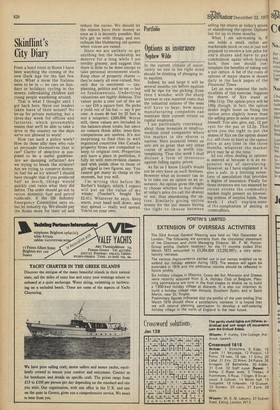Portfolio
Options as insurance
Nephew Wilde
In the current climate of uncertainty no one in his right mind should be thinking of plunging into equities.
Indeed, by and large it will be several months yet before equities will be ripe for the picking. Even then I wonder, with the sharp increase in raw material costs that the industrial nations of the west will have to bear, how many manufacturing companies can maintain their current return on capital employed. I am particularly concerned about those investors in small-tomedium sized companies where the market in the shares is narrow. Here potential losses on sale are so great that any other course of action is worth contemplating. Thus this week I shall discuss a form of insurance against falling equity prices.
As far as I know Lloyd's would not be very keen on such business. However what an investor can do is to take out an option as an insurance. An option gives the right to choose whether to buy shares at today's price (to call the shares) or not, thus abandoning the option. Similarly giving option money for the put means buying the right to choose between selling the shares at today's prices or abandoning the option. Options last for up to three months.
What I am advocating 'is, if one holds a small, rather unmarketable stock or one is just not prepared to receive a low price for one's shares and have to pay commission again when buying back, then one should contemplate the benefits of taking out a put option. A list of the costs of options of major shares is shown daily in the back pages of the Financial Times.
Let us now examine the technicalities of this exercise. Suppose the shares' of Xyz stand at 109p-111p. The option price will be 109p though, in fact, the option dealer might insist on fixing the option price slightly lower than the selling price in order to protect himself. You also give, say, 12 per cent for the put or 12.2p. This gives you the right to put the shares of Xyz on the option dealer (i.e. sell them to him) at the option price at any time in the three months, whatever the market price may be at the time. All too often dealing in options is sneered at because it is an expensive way of speculating. However, as I have explained it is also a safe, in a limiting sense, form of speculation that provides a degree of insurance. Finally for those investors not too stunned by recent events the commodity market might present an interesting avenue of surplus funds. Next week I shall explain some of the complexities of dealing in commodities.


































 Previous page
Previous page